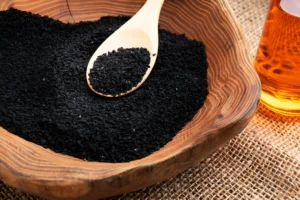
Understanding Bronchitis Types and Symptoms
To appreciate the potential benefits of black seed oil to bronchitis, it’s crucial to understand the different types of bronchitis and their respective symptoms.
- Acute Bronchitis: Viral infections are the most common cause of acute bronchitis and often accompany influenza or a cold.Attacks only last for four to five days after sustained mucus production can continue up to three weeks. Symptoms include coughing (sputum may be green, yellow, or bloody), fever, fatigue/weakness,tight chest and short breath. Treatment for acute bronchitis is typically supportive and may require no more than reassurance on the expectorant property of this medication.
- Chronic Bronchitis: This is the most serious and long lasting form of bronchitis from exposure to irritants like cigarette smoke, air pollution or dust. It develops due to the obstruction of bronchi in lungs that makes it harder for a person to breathe and leads them towards long-term symptoms like having a cough with mucus, frequent respiratory infections. Chronic bronchitis is a subtype of COPD and necessitated daily management to prevent flare-ups.
The Healing Power of Black Seed Oil in Treating Bronchitis
Black cumin seed oil, often referred to as black seed oil, is made from the seeds of the Southwest Asian native Nigella sativa plant. Numerous bioactive substances found in the oil, including beta-sitosterol, carvacrol, and thymoquinone, have demonstrated encouraging results in the treatment of respiratory conditions. Here’s how using black seed oil for bronchitis could help:
Supports Natural Defense Mechanisms and Optimizes Respiratory Function
Effective management of bronchitis relies on a well-functioning natural defense system. Black seed oil supports this by enhancing the production of crucial defense cells, such as lymphocytes and macrophages, which are vital for combating infections. It helps optimize respiratory function by modulating cytokine activity and other key response factors. This support not only aids in fortifying the body’s defenses but also helps regulate the body’s response to respiratory challenges. By improving overall resilience and balancing response mechanisms, black seed oil can help reduce the severity and duration of bronchitis symptoms, contributing to better respiratory health. Its therapeutic effects extend to alleviating digestive issues that impact respiratory comfort, thus providing a comprehensive approach to overall health.
Reduces Inflammation and Protects Against Cellular Damage
The main symptom of bronchitis, especially chronic bronchitis, is ongoing airway irritation. This inflammation can be lessened by the potent anti-inflammatory properties of black seed oil, which are mainly ascribed to thymoquinone and carvacrol. It has been demonstrated that pro-inflammatory cytokines, which are proteins involved in the inflammatory process, are inhibited by thymoquinone. The antioxidant qualities of the oil aid in reducing oxidative stress, which in bronchitis patients can exacerbate inflammation and result in cellular damage.
Combats Infections and Supports Respiratory Health
Acute bronchitis is often triggered by viral infections, while bacterial infections can complicate both acute and chronic bronchitis. Black seed oil has demonstrated significant antimicrobial and antiviral properties, making it a promising remedy for addressing the underlying infections that cause bronchitis. Research indicates that black seed oil can inhibit the growth of various bacteria and viruses, including antibiotic-resistant strains. This effectiveness helps reduce the incidence and severity of respiratory infections, contributing to overall respiratory health.
Mucolytic and Expectorant Effects
A major issue with bronchitis is excessive mucus production, which clogs the airways and makes breathing challenging. It is thought that black seed oil possesses mucolytic qualities, meaning it can aid in the breakdown and thinning of mucus, facilitating its removal from the lungs. This expectorant action eases congestion by reducing coughing and clearing the airways. Black seed oil helps maintain a clean respiratory system and lowers the risk of subsequent infections by promoting mucus ejection.
Bronchodilatory Effects
A key worry for those suffering with bronchitis, particularly chronic cases, is the narrowing of their airways. One of the primary active ingredients in black seed oil, thymoquinone, has been demonstrated to have bronchodilatory properties. This implies that it may facilitate breathing by relaxing and enlarging the bronchial tubes, which will increase the amount of air that enters the lungs. Black seed oil has bronchodilatory qualities that make it very helpful for people with bronchospasms or limited breathing.

How to Use Black Seed Oil for Bronchitis
To fully get the advantages of black seed oil, one must know how to use black seed oil for bronchitis. Here are a few efficient techniques:
Inhaling steam
Chest congestion and nasal channel clearance can be achieved by steam inhaling a solution made from a bowl of hot water infused with a few drops of black seed oil. By doing so, the active ingredients in the oil are sent straight to the respiratory system, where they instantly reduce inflammation and mucus accumulation. Mucus can be released and inflamed airways can be soothed by breathing in the steam for 10-15 minutes.
Topical Utilization
Coughing can be soothed and breathing made easier by rubbing the chest and back with a diluted mixture of black seed oil and a carrier oil (such as coconut or olive oil). Through skin penetration, the oil’s analgesic and anti-inflammatory qualities offer targeted relief. Children or others who have trouble breathing or ingesting food can find this approach very helpful.
Nebulization
Utilizing black seed oil through nebulization provides a targeted approach for managing chronic bronchitis. Deep lung penetration is made possible by inhaling a diluted oil mist that has been diluted with saline. This approach provides a useful therapeutic alternative by promoting mucus clearance and reducing inflammation. Nebulisation should not be started unless you have spoken with a healthcare provider to be sure it is safe and suitable for your particular situation.
Oral Ingestion
One of the simplest methods is consuming black seed oil orally. Daily intake of one or two tablespoons of the oil, preferably on an empty stomach, is recommended. If the taste is too strong, it can be mixed with honey or warm tea, both of which have additional soothing and antimicrobial properties. Since good oral health plays a crucial role in respiratory wellness, and poor oral hygiene or infections can contribute to bronchial complications, maintaining oral hygiene through remedies like black seed oil for teeth can indirectly support respiratory comfort and bronchitis management.
Supplement Capsules
Black seed oil is also available in convenient capsule form, offering an alternative for those who prefer to avoid the oil’s strong taste. These supplements are typically taken once or twice daily, according to the manufacturer’s instructions. Capsules make it easy to integrate the benefits of black seed oil into your daily routine without the need to deal with the oil’s flavor.
Benefits of Black Seed Oil and Chronic Bronchitis
It’s important to consider long-term advantages while thinking about natural treatments for chronic bronchitis. Prolonged inflammation, recurrent infections, and a progressive decline in lung capacity are all symptoms of chronic bronchitis. Because of its bronchodilatory, immune-stimulating, and anti-inflammatory qualities, black seed oil is a great supplemental treatment for chronic pain.
- Preventing Infections: Due to its antibacterial qualities, it may be able to help avoid secondary infections, which are frequent in patients with chronic bronchitis and frequently result in hospital stays.
- Enhancing Lung Function: Black seed oil has the potential to improve lung function and overall breathing capacity by functioning as a bronchodilator and increasing airflow to the lungs.
- Promoting Respiratory Comfort: Black seed oil helps people with chronic bronchitis feel more comfortable and have a higher quality of life by reducing symptoms like coughing and tightness in the chest.

Can Black Seed Oil Cure Bronchitis?
A common query is if black seed oil can effectively cure bronchitis. Black seed oil, known for its promising benefits in symptom relief and respiratory health support, is unlikely to serve as a standalone cure for bronchitis, particularly for chronic cases. It can, however, play a supportive role within a broader treatment approach, working in conjunction with established therapies like bronchodilators, steroids, and antibiotics to enhance overall treatment outcomes. For acute bronchitis, which often resolves within a few weeks, black seed oil good for bronchitis may help speed up recovery and ease symptoms. In chronic cases, regular use of the oil may help reduce flare-ups and improve quality of life, although it should not replace standard medical treatments.
Scientific Validation of Black Seed Oil for Bronchitis
Studies in science have become more and more concerned with how black seed oil helps respiratory ailments. Numerous medical publications have published research showcasing the oil’s powerful anti-inflammatory, antioxidant, and antibacterial characteristics. Thymoquinone, a primary active ingredient in black seed oil, has been shown in a research published in the “Journal of Ethnopharmacology” to considerably reduce airway inflammation and enhance lung function in animal models of respiratory illnesses.
Black seed oil has also been demonstrated in human clinical trials to improve lung function and lessen symptoms in asthmatic and other respiratory patients, implying possible advantages for bronchitis sufferers as well. The entire spectrum of its effects, including its capacity to regulate immunological responses and combat infections that worsen bronchitis symptoms, are still being investigated by ongoing study.
Is Black Seed Oil Good for Bronchitis?
Black seed oil is generally considered safe for most people when used appropriately, but there are a few precautions to keep in mind:
- Possible Allergic Reactions: Skin irritation or allergic responses are possible for certain people. Do a patch test first before applying topically, always.
- Interactions with Medications: Black seed oil may interact with certain medications, particularly those that affect the liver or blood clotting. If you use medication or have underlying medical issues, see a healthcare practitioner.
- Dosage Considerations: The appropriate dosage of black seed oil can vary based on individual factors such as age, health status, and the severity of bronchitis. It is best to begin with a lesser dose and raise it gradually while working with a healthcare provider.
- Pregnancy and Breastfeeding: Pregnant or breast- feeding women should consult a healthcare provider before using black seed oil, as its safety in these conditions have not been fully evaluated.
Practical Tips for Using Black Seed Oil Effectively
To maximize the benefits of black seed oil for bronchitis, consider the following practical tips:
| Recommendation | Guidance |
| Choose Premium Oil | Select pure, cold-pressed black seed oil. Look for certified organic options without additives. |
| Combine with Complementary Remedies | Boost benefits by using alongside honey, ginger, or garlic, each with additional health properties. |
| Maintain a Balanced Lifestyle | Adopt a nutritious diet, exercise regularly, quit smoking, and avoid pollutants to support lung health. |
| Monitor Your Progress | Track symptoms to evaluate effectiveness. Seek medical advice if there is a worsening of symptoms. |
| Ensure Adequate Hydration | Drink plenty of water to help thin mucus and enhance the relief provided by black seed oil. |
Personalized Use and Future Research on Black Seed Oil for Bronchitis
Personalizing the use of black seed oil for bronchitis involves tailoring its application to individual health conditions and the severity of symptoms. Techniques like steam inhalation and oral consumption can reduce the length of the disease and offer instant relief for acute bronchitis. Combining long-term treatments for chronic bronchitis, such as nebulisation and frequent oral intake, may be more successful in controlling lingering symptoms and enhancing lung function. In order to completely comprehend the advantages of black seed oil, more study is required. Larger clinical trials could validate its efficacy, determine optimal dosages, and identify the most effective administration methods. Exploring the oil’s mechanisms of action and its potential in combination with other treatments could enhance its therapeutic role. Black seed oil shows promise but should complement, not replace, conventional treatments and be used under professional guidance.
Key Takeaways
Black cumin seed oil presents a promising natural remedy for bronchitis, attributed to its anti-inflammatory, antimicrobial, bronchodilatory, and immune-boosting properties. Although it may not provide a complete cure for bronchitis, regular use of black seed oil bronchitis could significantly alleviate symptoms, reduce the frequency of flare-ups, and enhance overall respiratory health. To maximize the benefits, it is crucial to use high-quality oil and consult with healthcare professionals. Integrating black cumin seed oil for bronchitis into a comprehensive approach, which includes a healthy lifestyle and proper use, may offer substantial relief and better symptom management. With continued research into black seed oil’s benefits, it holds potential as a valuable asset in managing respiratory ailments.









